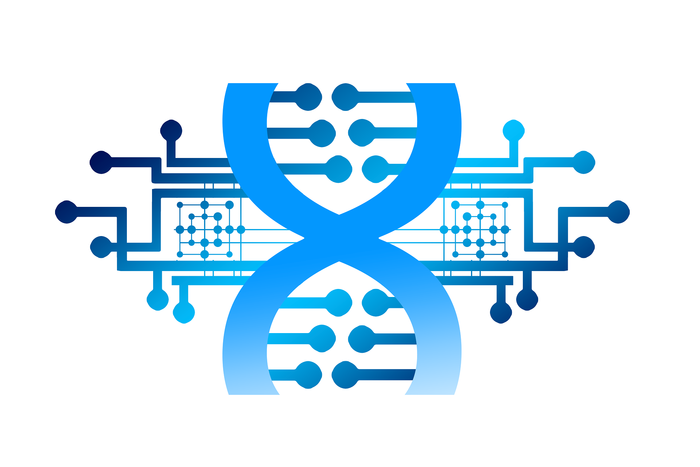The term ‘DNA’ immediately calls to mind the double-stranded helix that contains all our genetic information. But the individual units of its two strands are pairs of molecules bonded with each other in a selective, complementary fashion. Turns out, one can take advantage of this pairing property to perform complex mathematical calculations, and this forms the basis of DNA computing.

Credit: Gerd Altmann from Pixabay
The term ‘DNA’ immediately calls to mind the double-stranded helix that contains all our genetic information. But the individual units of its two strands are pairs of molecules bonded with each other in a selective, complementary fashion. Turns out, one can take advantage of this pairing property to perform complex mathematical calculations, and this forms the basis of DNA computing.
Since DNA has only two strands, performing even a simple calculation requires multiple chemical reactions using different sets of DNA. In most existing research, the DNA for each reaction are added manually, one by one, into a single reaction tube, which makes the process very cumbersome. Microfluidic chips, which consist of narrow channels etched onto a material like plastic, offer a way to automate the process. But despite their promise, the use of microfluidic chips for DNA computing remains underexplored.
In a recent article—made available online in ACS Nano on 7 July 2021 and published in Volume 15 Issue 7 of the journal on 27 July 2021—a team of scientists from Incheon National University (INU), Korea, present a programmable DNA-based microfluidic chip that can be controlled by a personal computer to perform DNA calculations. “Our hope is that DNA-based CPUs will replace electronic CPUs in the future because they consume less power, which will help with global warming. DNA-based CPUs also provide a platform for complex calculations like deep learning solutions and mathematical modelling,” says Dr. Youngjun Song from INU, who led the study.
Dr. Song and team used 3D printing to fabricate their microfluidic chip, which can execute Boolean logic, one of the fundamental logics of computer programming. Boolean logic is a type of true-or-false logic that compares inputs and returns a value of ‘true’ or ‘false’ depending on the type of operation, or ‘logic gate,’ used. The logic gate in this experiment consisted of a single-stranded DNA template. Different single-stranded DNA were then used as inputs. If part of an input DNA had a complementary Watson-Crick sequence to the template DNA, it paired to form double-stranded DNA. The output was considered true or false based on the size of the final DNA.
What makes the designed chip extraordinary is a motor-operated valve system that can be operated using a PC or smartphone. The chip and software set-up together form a microfluidic processing unit (MPU). Thanks to the valve system, the MPU could perform a series of reactions to execute a combination of logic operations in a rapid and convenient manner.
This unique valve system of the programmable DNA-based MPU paves the way for more complex cascades of reactions that can code for extended functions. “Future research will focus on a total DNA computing solution with DNA algorithms and DNA storage systems,” says Dr. Song.
With such a convincing proof of concept, it’s not hard to imagine DNA-based computers becoming everyday objects quite soon!
***
Reference
DOI: https://doi.org/10.1021/acsnano.1c02153
Authors: Wonjin Lee, Minsang Yu, Doyeon Lim, Taeseok Kang, and Youngjun Song
Affiliations: Incheon National University, Korea
About Incheon National University
Incheon National University (INU) is a comprehensive, student-focused university. It was founded in 1979 and given university status in 1988. One of the largest universities in South Korea, it houses nearly 14,000 students and 500 faculty members. In 2010, INU merged with Incheon City College to expand capacity and open more curricula. With its commitment to academic excellence and an unrelenting devotion to innovative research, INU offers its students real-world internship experiences. INU not only focuses on studying and learning but also strives to provide a supportive environment for students to follow their passion, grow, and, as their slogan says, be INspired.
Website: http://www.inu.ac.kr/mbshome/mbs/inuengl/index.html
About the author
Youngjun Song received his Ph.D. in Electrical Engineering from the University of California, San Diego in 2014. He is currently Assistant Professor at the Department of Nano-Bioengineering, Incheon National University. His research interests are Bio-electronic chips, DNA storage, and computer systems.
Journal
ACS Nano
DOI
10.1021/acsnano.1c02153
Method of Research
Experimental study
Subject of Research
Not applicable
Article Title
Programmable DNA-Based Boolean Logic Microfluidic Processing Unit
Article Publication Date
27-Jul-2021
COI Statement
None




